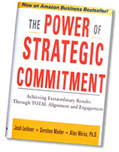Jack Welch spent the first 2 hours of a recent two-day executive training session extolling the benefits of being honest and direct. “People don’t know where they stand, and are then surprised during their performance review or when released. Without candor, everything slows down!” Having read about Mr. Welch’s in-your-face management style I was still a bit shocked, but the simple truth of what he was saying was unarguable – and quite refreshing.
My 7th grade football coach told me after practice one day: “You know what your problem is? You can’t throw.” Given my dreams of becoming the next Joe Namath I was disappointed and a bit offended. But he was right – and his blunt feedback spurred me to practice a heck of a lot more, and focus on what I was pretty good at – catching! I got a little better at throwing and a lot better at catching; I was better off and so was the team.
Trying to get executives to be honest with each other – as one CEO I work with says, “Creating a Culture of Truth” – can be a difficult undertaking. We don’t want to hurt other’s feelings; we don’t want to be perceived as mean or thoughtless, or of setting ourselves up for possible future payback. There are a whole variety of good reasons why candor is chancy, if not downright dangerous.
But consider the alternative – as another client calls it – “a Culture of Politeness.” If people in your company are passionate about pursuing a direction, or are encountering issues that are impeding productivity and profits, would you prefer they remain polite and cautious? As Margaret Thatcher so brilliantly put it, “What great cause would have been fought for and won under the banner ‘I stand for consensus’”?
Read the entire article at Entrepreneur.com here.

